
Imre Kertész was a Hungarian author and recipient of the 2002 Nobel Prize in Literature, "for writing that upholds the fragile experience of the individual against the barbaric arbitrariness of history". He was the first Hungarian to win the Nobel in Literature. His works deal with themes of the Holocaust, dictatorship and personal freedom. He died on 31 March 2016, aged 86, at his home in Budapest after suffering from Parkinson's disease for several years.

Marcel Reich-Ranicki was a Polish-born German literary critic and member of the literary group Gruppe 47. He was regarded as one of the most influential contemporary literary critics in the field of German literature and has often been called Literaturpapst in Germany.

Hans Magnus Enzensberger is a German author, poet, translator and editor. He has also written under the pseudonym Andreas Thalmayr.

Claudio Magris is an Italian scholar, translator and writer. He was a senator for Friuli-Venezia Giulia from 1994 to 1996.
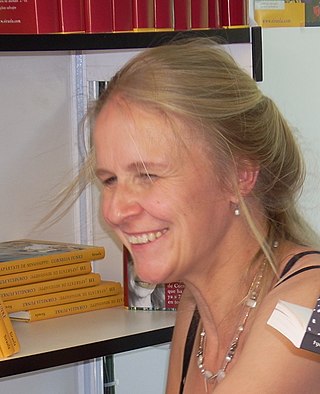
Cornelia Maria Funke is a German author of children's fiction. Born in Dorsten, North Rhine-Westphalia, she began her career as a social worker before becoming a book illustrator. She began writing novels in the late 1980s and focused primarily on fantasy-oriented stories that depict the lives of children faced with adversity. Funke has since become Germany's "best-selling author for children." Her work has been translated into several languages and, as of 2012, Funke has sold over 20 million copies of her books worldwide.

Uwe Timm is a German writer.
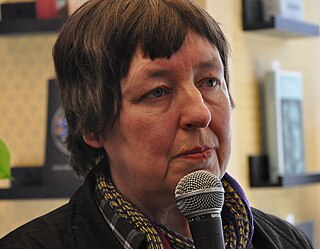
Leena Krohn is a Finnish author. Her large and varied body of work includes novels, short stories, children's books, and essays. In her books she deals with topics that include man's relationship with himself and the world, morality, borders between reality and illusion, and the problem of life, especially through observing different kinds of artificial intelligence.

Karin Fossum is a Norwegian author of crime fiction, often referred to as the "Norwegian queen of crime".
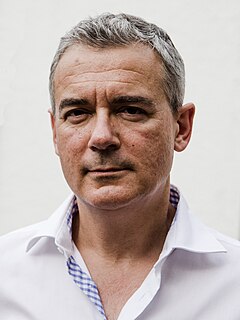
Ilija Trojanow is a Bulgarian–German writer, translator and publisher.
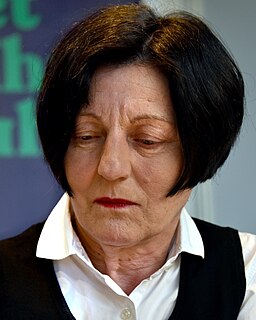
Herta Müller is a Romanian-born German novelist, poet, essayist and recipient of the 2009 Nobel Prize in Literature. Born in Nițchidorf, Timiș County in Romania, her native language is German. Since the early 1990s, she has been internationally established, and her works have been translated into more than twenty languages.
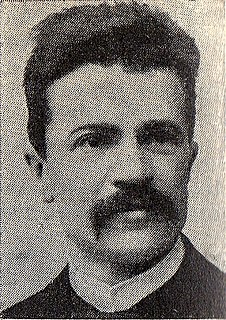
Kaarle Krohn was a Finnish folklorist, professor and developer of the geographic-historic method of folklore research. He was born into the influential Krohn family of Helsinki. Krohn is best known outside of Finland for his contributions to international folktale research. He devoted most of his life to the study of the epic poetry that forms the basis for the Finnish national epic, the Kalevala.

Frank Valentine Van der Stucken was a Belgian-American composer, conductor, and founding conductor of the Cincinnati Symphony Orchestra in 1895.

Michendorf is a municipality in the Potsdam-Mittelmark district, in Brandenburg, Germany.

The Kurd Laßwitz Award is a science fiction award from Germany. The award is named after the science fiction author Kurd Laßwitz. Eligible for nomination in all categories except for the Foreign Work category are only works published in German originally.
Marcus Pfister is a Swiss author and illustrator of children's picture books.
Heinrich Schmieder was a German actor.

Elke Heidenreich is a German author, TV presenter, literary critic and journalist. She has written audio plays, a magazine column, scripts for television plays and books. Heidenreich is known as the Kabarettist who created a character, Else Stratmann. She is a literary critic in the television Literaturclub of the Schweizer Fernsehen.

Ulrike Draesner is a German author. She was awarded the 2016 Nicolas Born Prize.

Robert Schneider is an Austrian writer, who published novels including Schlafes Bruder, texts for the theatre, and poetry. His works have been translated to many languages. Schlafes Bruder became the basis of a film, a ballet, an opera and several plays, and received international awards. Schneider withdrew from writing in 2007.
Irina Liebmann is a German journalist-author and sinologist of Russo-German provenance. She has won a number of important literary prizes: the most significant of these, probably, was the 2008 Leipzig Book Fair non-fiction Prize, awarded for "Wäre es schön? Es wäre schön!", a biography of her father, a noted anti-Nazi activist and political exile in Warsaw and Moscow who, after 1945, returned to what became, in 1949, the German Democratic Republic and in 1953, despite his longstanding record of communist activism, emerged as an uncompromising critic of the East German leader Walter Ulbricht: he was expelled from the party and suffered various other government mandated public indignities. She grew up and lived the first part of her adult life in the German Democratic Republic, but succeeded in moving to West Berlin during 1988, thereby anticipating reunification by more than a year.
















